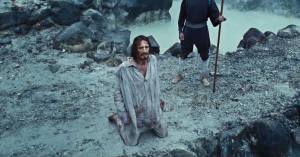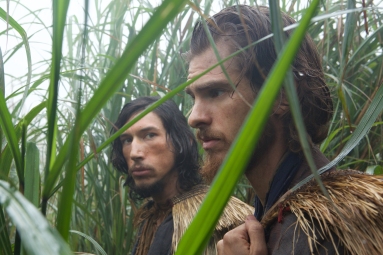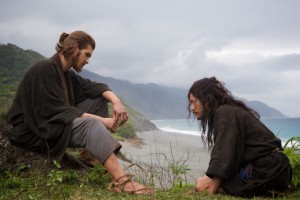Martin Scorsese and I had very different reactions whilst reading Shusaku Endo’s acclaimed novel, Silence. He thought: this will make a great movie, even if it takes me 28 years to bring it to theatres (and it did). I, however, got through the book like one gets through a prison sentence: head down, one day at a time, putting in my time, hoping it  doesn’t kill me. Having read the book, I knew exactly what we were in for with the movie, and I warned anyone who would listen, but that doesn’t mean I didn’t want to see it. It’s Scorsese. I mean, that alone is enough. But I also know that Martin Scorsese has something to say about spirituality, and if he’s gotten away from it with his last few movies, this one is a major reinvigoration of his theme.
doesn’t kill me. Having read the book, I knew exactly what we were in for with the movie, and I warned anyone who would listen, but that doesn’t mean I didn’t want to see it. It’s Scorsese. I mean, that alone is enough. But I also know that Martin Scorsese has something to say about spirituality, and if he’s gotten away from it with his last few movies, this one is a major reinvigoration of his theme.
Little Marty was friends with a loving and influential priest growing up, and this encouraged him to join a seminary to become a priest himself. Lacking a true calling to the vocation, Scorsese flunked out, but he never stopped asking himself how a priest got past his own ego, his own pride, to put the needs of his parishioners first.
In many ways, that’s exactly what the film Silence asks of its main protagonist Father Rodrigues (Andrew Garfield), a Christian missionary sent to Japan in the 1600s, when Christianity was outlawed, and his presence forbidden. He and Father Garrpe (Adam Driver), in search of their mentor Father Ferreira (Liam Neeson), make the voyage to a land unknown. They haven’t heard from him directly in years, but there are rumours that he has renounced his faith. Certain that this cannot be true, the two young missionaries vow to find and rescue him, while restoring the faith of their underground followers.
Praise be to Scorsese’s cinematographer, Rodrigo Prieto, who helps create this world with so many natural touches: fog allowed to hide and obscure, fire reminding us of the hell  that Rodrigues faces, or the hell that he’s in now. Even though the movie is relentlessly brutal, you’ll still be wowed by the images, the beauty lurking within the swamp.
that Rodrigues faces, or the hell that he’s in now. Even though the movie is relentlessly brutal, you’ll still be wowed by the images, the beauty lurking within the swamp.
Silence is uncomfortable – truly, truly uncomfortable. The tortures are otherworldly. What’s the takeaway from these 161 minutes of quiet pierced with merciless violence? Silence leaves you with more questions than answers, and how you feel about it will depend on how filled with god’s love your heart is going in. Yes it’s a meditation on religion and spirituality, but it isn’t afraid to point-blank ask us whether we’ve heard or felt god in the silence. Is he there, quietly observing his people be tortured and killed? Is he there, silently allowing persecution and murder? Does silence sow seeds of doubt?
For the most part, Scorsese seems to be fairly neutral in the plight of Christians vs. Japan. I definitely felt the strong whiff of colonization, the belief that the stories white people tell each other about their god and heaven are somehow more true than the stories the Japanese have been telling for centuries. Not just more true but The Truth. These might be 17th century problems, but they sound very familiar – almost like those same problems are here in the 21st century as well.
 This Asshole Atheist really noticed the distinction between religion and faith – religion being something a government can choose to eradicate; faith, however, is much more difficult. Silence is really a question of belief, not just what you believe, but how strongly you believe it, how strongly you think others should believe it, how far you’re willing to go to impose those beliefs, how much pain you can endure before you abandon those beliefs. And if god himself can hide in silence, can belief dwell there also?
This Asshole Atheist really noticed the distinction between religion and faith – religion being something a government can choose to eradicate; faith, however, is much more difficult. Silence is really a question of belief, not just what you believe, but how strongly you believe it, how strongly you think others should believe it, how far you’re willing to go to impose those beliefs, how much pain you can endure before you abandon those beliefs. And if god himself can hide in silence, can belief dwell there also?
With Martin Scorsese at the helm, you already know this is a disciplined and wondrous exercise in film making, perhaps a masterpiece among masterpieces from this celebrated auteur. But Silence is best discussed by the feelings it evokes in the viewer. It’s meant to be thought-provoking. If god is love, is it better to love god even in the face of threat, or is it better to love our fellow man even when it means denying god? One gruesome scene marches into another, never quite glorifying the martyr, never quite condemning the oppressor. Maybe the point is that there is no point. Silence is a theological debate that grants permission to test the limits of faith, to ask the unanswerables. It is difficult to watch and difficult to process but I believe that Silence is meaningful even to the non-believer: it’s just that good a film.

Thank you for an excellent review. Now I am in difficult situation; keen to see the film but afraid I may not be strong enough to do so.
LikeLike
It’s rough. Watch it with a friend, or at home where you can pause it and take breaks!
LikeLiked by 1 person
Happy to see this review because I’ve been wondering about this film. Will definitely see it now.
LikeLike
Jay,
Scorsese shaped spirituality…I’m there. 😉
RR
LikeLike
Yeah, he really does have something to say, even if he still wants you to draw your own conclusions.
LikeLiked by 1 person
I’m definitely adding Silence to my must see movie list now!💁🏻
LikeLike
How preachy is this shit? I think I would rather hurt myself than watch some three hour movie about fucking religion. Feel free to edit this comment if you like. Miss you folks!
LikeLike
Great review. I saw the trailer and thought “that looks pretty interesting”. Definitely sounds it. You just convinced me to make the effort to get out and see this.
LikeLike
great review, jay. as a grad student in theology, I’m glad to hear it mostly refrains from preachiness and just leaves the questions on the table! that’s the way it should be with such big issues. looking forward to seeing this one! Scorsese hasn’t failed me yet.
LikeLike
I think it really shows the different ways people approach both faith (the internal relationship with god) and religion (the external relationship with god) and really makes you think about which one is more important.
LikeLiked by 1 person
That’s great to hear. It’s an important distinction to make!
LikeLike
Goddamn this movie was hard to get through. But wonderful. This movie is so SO tonally different from Scorsese’s previous that it’s almost like anyone who enters Silence is going to feel like they’re atoning for all the good times they had in The Wolf of Wall Street.
LikeLiked by 1 person
It really is a lot different from what he’s done lately, and I was thinking about anyone who doesn’t know some of his back catalogue might be caught off guard. I think even some critics are! It’s a lot to take.
LikeLiked by 1 person
I wasn’t aware of it at first but it’s one of those that kind of starts hitting you after you’ve seen it. Great movie though. I think it could be better than Wolf of Wall Street
LikeLike
You could be right. It’s just SO hard to even compare them!
LikeLiked by 1 person
Terrific review and that’s a cool factoid about Scorsese flunking. I had Silence on my most anticipated 2016 movies list, should be worth the wait.
LikeLike
I really want to see this film because it sounds intelligent and makes one think. This is a great review….makes me want to see it even more.
LikeLike
Great review.
I’ve heard such mixed things about this movie, but this actually got down to some reasons why I think it does get such mixed reviews.
LikeLike
Being a fan of Scorsese and as someone who has been brought up as Catholic. I’m really eager to see this.
LikeLike
CAn’t wait to hear your thoughts!
LikeLike
I saw the screening of this with Scorsese, Adam Driver and Andrew Garfield in discussion after. What a difficult film. Gorgeous cinematography. It helped to hear the cast and Scorsese discuss after because it was a long and tough “slog”. Sorry Marty.
LikeLike
I wonder at your struggling through the book. I don’t know if this one is for me, but it sounds like it’s finding the audience that needs it.
LikeLike
Great review, this still hasn’t come out in a theater near me yet. Hopefully soon.
LikeLike
Gahh, if the movie itself was as interesting as your post I’d see it without hesitation, but it just sounds like such a struggle! I will see it, I just don’t know when…
LikeLike
Great Film, Should be up there with Award consideration
LikeLike
Yes. It’s been largely ignored so far, so perhaps even the industry people find this one just a bit too bleak. Still really worthwhile though, if you can handle it.
LikeLike
It will have to be done.
LikeLike
Well you hooked me good on this one Jay….. I’ll be watching for it:)
LikeLike
A great review Jay with something to say and saying it well.
LikeLike
Wow, I never imagined it to be so difficult to get through. This is Scorsese right, not Lars Von Trier…
LikeLike
The book is pretty much torture porn.
LikeLiked by 1 person
Pingback: Oscar Nominations 2017 | ASSHOLES WATCHING MOVIES
Pingback: Paterson | ASSHOLES WATCHING MOVIES
Your review beautifully captures the essence of this film Jay, thank you. It is indeed “a disciplined and wondrous exercise in film making”, but also a political treatise on the nature of faith viewed through a post-colonial lens that explores how one belief system sought to impose itself upon another. It is both a complex film and at the same time very simple: religious arrogance is responsible for untold misery through the ages.
LikeLike
If you’re cool with agreeing to disagree, I finally caught this pic and it was PAINFUL. I found the acting awkward, and about 2 hours I just wanted to stand up and shout “apotheosize for Christ’s sake” but I guess that probably would not have been an effective response. I expect the movie wanted to test me,and it DID. I am kinda excited about seeing the Batman Lego movie so maybe that says more about me than I should admit to. 🙂 Harlon
LikeLike